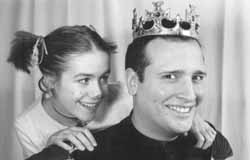
Molly Flynn and Carlos Zalduondo star in "Poona the F*#kdog."
Media Credit: danielle fauteux jacques/PHOTO COURTESY
The Daily Free Press - December 7, 2000

Molly Flynn and Carlos Zalduondo star in "Poona the F*#kdog." Media Credit: danielle fauteux jacques/PHOTO COURTESY |
The story of "Poona the F*#dog" begins with who else but Poona (Molly Flynn), a "f*#kdog" living in an enchanted forest. Poona is lonely because she cannot find anyone to play with her and doesn't understand why. One day her "fairy god phallus" pays an unexpected visit and gives her a magical gift: a big, pink box with great games inside. Suddenly, as Poona discovers the wonders of this new box, everyone wants to play with her. She meets a handsome prince (Carlos Zalduondo) and the two of them play inside the box everyday, which makes Poona a very happy f*#dog. However, one day he doesn't show up and Poona becomes confused because she can't think of any reasons why. When she sees the Prince again, he tells her he's leaving her for good-there are, after all, plenty of other f*#kdogs to play with.
This leads Poona to a path of self-discovery in the land of Do, where a television set reigns as king. After becoming a town celebrity by realizing her hidden athletic ability, Poona is suddenly faced with the pros and cons of her fame. She eventually plummets into a life of greed, addiction, corruption and moral deterioration, and is finally forced to come to terms with the choices she has made and the friends she has lost because of them.
Meanwhile, several other characters in the land of Do have problems of their own, including two aliens who have accidentally landed in the play. The adventures of these extra-terrestrials (who prefer the politically correct term "planetarily-challenged,") provide show-stopping humor as they try to get home and understand why they are offending everyone they encounter.
Although one may never fully understand what exactly a f*#kdog is, "Poona" maintains enough intelligence throughout its to keep the audience either at the edge of their seats or doubled over in laughter. While several obvious metaphors, such as a "pink box" could easily be lost in trite humor, Jeff Goode's outrageous take on sex, relationships, politics, advertising and religion never gives way to the norm of the expected. His detailed script chews on today's biggest issues like a hungry dog and then spits them back in fairytale form.
Yet, because "Poona the F*#kdog" is one play that could never survive on script alone, the uniformly multi-talented cast of this show should be praised for keeping each and every character alive and continually interesting. However, the greatest performance of the night undoubtedly comes from Molly Flynn, whose take on the title character should be commended for creating an obvious depth to a dog of such nature. From her first "woof" as she makes her entrance to the last pant heard on stage, her presence captivates the audience throughout the entire show's one hour, 45-minute run. If the weight of the show rests on her shoulders, then Poona comes out stronger than a wolf. And as it turns out, the cast sports musical talents as well. Breaking into song at least three times within the show, the play's characters turn this performance into an unexpected piece of musical theater. However, although this may be a courageous attempt to continue "Poona's" offbeat form, the numbers seem to only add up to a whole lot of incomprehensible noise. Because the plot of the show is further carried along within these memorable ditties, it seems detrimental to either get rid of the music or tell the phallic symbol singing lead vocals to speak with a clearer tone. This, along with the absence of intermission, may remain the lone flaw of "Poona." However, as the cast exits the stage and the lights begin to rise, it seems easier to forgive these faults, rather than to dwell on them.
For those who want to experience a night of the avant-garde, let down your hair and take "Poona" for a wild ride.